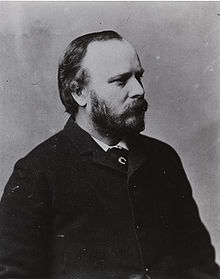Samuel W. Williston
| Samuel Wendell Williston | |
|---|---|
 |
|
| Born |
July 10, 1851 Boston, Massachusetts, United States |
| Died | August 30, 1918 (aged 67) Chicago, Illinois, United States |
| Nationality | American |
| Citizenship | United States |
| Alma mater |
Kansas State Agricultural College Yale University |
| Known for | Allosaurus, Diplodocus, illustrations, terrestrial origin of bird flight |
| Scientific career | |
| Fields | Paleontology |
| Institutions |
Yale University University of Kansas University of Chicago |
Samuel Wendell Williston (July 10, 1851 – August 30, 1918) was an American educator and paleontologist who was the first to propose that birds developed flight cursorially (by running), rather than arboreally (by leaping from tree to tree). He was also an entomologist, specialising in Diptera.
He is remembered for Williston's law, which states that parts in an organism, such as arthropod limbs, become reduced in number and specialized in function through evolutionary history.
Williston was born in Boston, Massachusetts to Samuel Williston and Jane A. Williston née Turner. As a young child, Williston's family travelled to Kansas Territory in 1857 under the auspices of the New England Emigrant Aid Company to help fight the extension of slavery. He was raised in Manhattan, Kansas, attended public high school there, and graduated from Kansas State Agricultural College (now Kansas State University) in 1872, afterwards receiving a Magister Artium from that institution.
In 1874, he went on his first field fossil hunting expedition for Othniel Charles Marsh at Yale University under the mentorship of Benjamin Franklin Mudge, and led his first expedition in 1877. With Mudge, Williston discovered the first fossils of the dinosaurs Allosaurus and Diplodocus. He was noted for painstakingly illustrating the finds. In 1880, he matriculated to Yale University, for several years was a post-graduate student and faculty member. Around this time, he proposed the first explicit model for the terrestrial origin of bird flight (i.e., that dinosaurs developed flight by running along the ground rather than jumping from trees).
...
Wikipedia
